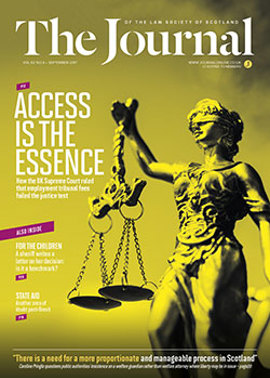Limited partnerships and the PSC register

On 6 April 2016 new requirements for making available information on “people with significant control” (PSC) of certain UK entities such as UK private limited companies and limited liability partnerships came into force. Entities subject to the requirements had to create and maintain a register of PSCs.
From 24 July 2017, the Scottish Partnerships (Register of People with Significant Control) Regulations 2017 (SI 2017/694) extended the scope of these requirements to limited partnerships, as well as to certain general partnerships in Scotland. For existing partnerships which fall within the ambit of SI 2017/694, action was required by Monday 7 August 2017. If a body covered by the regulation is created after 7 August, the regulation must be complied with from the outset.
Who is affected?
This might seem an odd topic to appear in the agricultural update, but this further regulation applies to any “eligible Scottish partnerships”, which are: (1) any limited partnership which is registered in Scotland, including limited partnerships which have been set up for the purposes of an agricultural lease being granted to the partnership; or (2) a Scottish general partnership of which the partners are, directly or indirectly, all limited companies. Many Scottish limited partnerships may well have had no need to contact the Registrar of Companies other than during their initial registration.
What must be done?
Registration with the Registrar of Companies for Scotland must be made of any PSC of an eligible Scottish partnership. A PSC is one that fulfils any of five conditions:
- The person holds, directly or indirectly, the right to more than 25% of any surplus assets in an eligible Scottish partnership on its being wound up.
- The person holds, directly or indirectly, more than 25% of the equivalent to voting rights in an eligible Scottish partnership.
- The person holds the right, directly or indirectly, to appoint or remove the majority of the persons who are entitled to take part in the management of an eligible Scottish partnership.
- The person has the right to exercise, or actually exercises, significant influence or control over an eligible Scottish partnership.
- The person has the right to exercise, or actually exercises, significant influence or control over the activities of a trust or firm; the trust or firm is not a legal person (under the law by which it is governed); and the trustees of the trust or the members of the firm meet any of the other conditions, or would do so if they were individuals. For example, a partner of an English partnership (“EP”, with no legal personality) holds the right to more than 25% of any surplus assets in an eligible Scottish partnership on it being wound up. EP has an adviser (“A”) who exercises significant influence or control over the activities of EP. A is a PSC.
The meaning of “significant influence or control” is expanded upon in Government guidance, available from the gov.uk website.
If there is only one general partner in a limited partnership, that general partner will be a PSC. Where there are several general partners, whether they are PSCs depends on the circumstances of each instance.
The information which must be provided includes name, address and the nature of control over the eligible Scottish partnership, as well as other details which vary depending on whether the PSC is an individual or a company or the like. Provision is made for the protection of a person’s usual residential address. The information must be submitted to the registrar, but will not be made available generally to the public. On application, certain other information can also be withheld from general public inspection.
If there are no PSCs, that information must also have been sent to the registrar by the deadline of 7 August.
What are the responsibilities?
The eligible Scottish partnership is responsible for gathering the information and the PSCs are obliged to provide it.
The registered information must be kept up to date.
If the partnership ceases to be a qualifying partnership, that is also a change which must be registered, but no further registration is required after that.
Any failure to meet the 7 August deadline or the ongoing reporting obligations is an offence, which is punishable by a fine “not exceeding level 5 [£5,000] on the standard scale and, for continued contravention, a daily default fine not exceeding the greater of £500 and one-tenth of level 4 [£2,500] on the standard scale” (reg 9(3)(b), SI 2017/694).
What can a limited partner do?
Although limited partners must not take part in the management of the partnership business, they are able to advise with the general partner(s). As the partnership as a whole can incur liabilities for failure to comply with the regulations, limited partners should consider doing so in this case.
In this issue
- Talaq and the growing challenge of overseas divorces
- Too close to the wind? (1)
- The Land Register: two ticking timebombs
- Adult ADHD: a performance management issue
- Reading for pleasure
- Opinion: Sandra McDonald
- Book reviews
- Profile
- President's column
- ScotLIS enters user test phase
- People on the move
- Priced out of justice
- The residence nil rate band – are your clients affected?
- State aid outside the EU
- IP actions at the Court of Session
- Give me liberty or give me a welfare attorney
- Personal injury trusts and professional trustees
- How to protect your firm and your clients from email fraud
- Court to child: a different approach
- Who can appeal a contempt ruling?
- Moveable property: reform at last?
- Too close to the wind?
- Limited partnerships and the PSC register
- Scottish Solicitors' Discipline Tribunal
- Recent changes to the PSG offer to sell
- Assigned standard securities
- On our own feet
- OPG tackles rising demand for PoAs
- Law reform roundup
- PI court timetable amended
- Reception greets Accredited Paralegal scheme
- Making paper history
- Your Law Society of Scotland Council members
- Master Policy renewal: it's easy online
- Ask Ash
- AML risks and company services
- Thinking of getting engaged?
- Q&A corner






